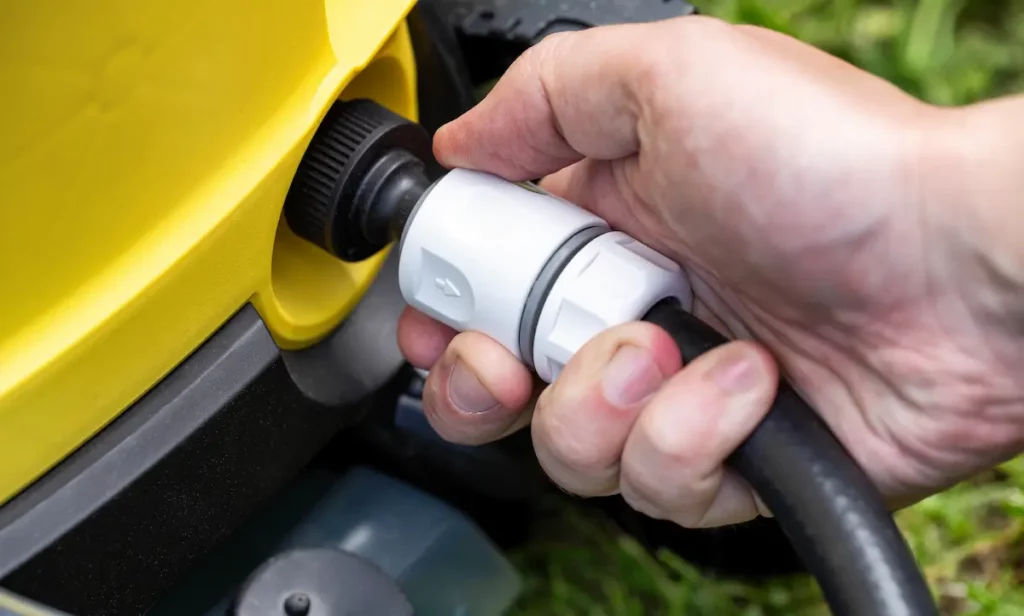Wondering if pressure washer hoses are universal? Pressure washers come with several interchangeable parts. The washer hoses aren’t universal as the connection can vary. However, there are only a few options to choose from which makes replacing your hose a little easier.
Going to use your pressure washer, you find that the hose is damaged. Time to head to the shop and grab yourself a new one. The one-size-fits-all philosophy you had is pushed aside when you discover that the washer hose isn’t as universal as you hoped.
How do you determine which hose is the best replacement for you? Read on as we show you all you need to know to make an informed purchase.

Related Reading: Will a 100 Ft Hose Work on a Pressure Washer?
Pressure Washer Hoses – Four Things to Consider With
Buying a new hose isn’t a big ordeal. The major factor is the way the hose connects to your washer, then you need to consider the length and diameter of the hose. Finally, there is the material from which the hose is made.
1. Hose Length
The last thing you want when power washing is a hose that doesn’t reach where you want to clean. To avoid that frustration you need to consider:
- How far away from the pressure washer will you be to get the job done
- Is the area that you want to clean high? How high?
- The weight of the hose when it’s got water pumping through it. The longer the hose, the heavier it can be.
To save yourself from grief, you should get a hose that is between 50-feet to 100-feet in length. That will allow you to tackle the jobs around your home. If you need anything longer, you can connect an extra hose to your current one to extend the length.
2. Diameter
Make sure that you match the right diameter hose to your pump. If the pressure from your washer is greater than what your hose can handle, you will end up ruining the hose. You will find that there several diameters.
- 1/4″: This suits both gas and electric pressure washers. It can cope with pressure up to 2,700 PSI. You may find some in this diameter that can support 3,200 PSI. 1/4″ is the typical size for a pressure washer you use around your home.
- 5/16”: It’s a size that isn’t common. This type of hose can handle 2,700 to 3,400 PSI. Mainly gas-powered washers use this style of hose.
- 3/8″: The widest diameter. It’s a hose that more powerful washers use. Also, commercial-grade machines require this hose. A 3/8″ hose is made to cope with 5,000 PSI and the more robust hoses can manage 10,000 PSI. You could also consider using it on your consumer-grade washer.
3. Material of the hose
Regarding what the hose is made of, you need to think about the cost of the hose and how hardy you want it to be.
- Plastic
Plastic washer hoses are the cheapest option. They are ideal for your home washer and can be wound around a hose reel to keep things tidy. However, if you are frustrated with hoses kinking, then maybe you should look at getting one made from rubber or polyurethane.
- Rubber
These are more flexible than their plastic counterparts. Also, rubber hoses are better at retaining pressure. The downside with these hoses is that they have more weight. Plus, they can leave marks on surfaces when you are dragging the hose.
Still, it’s an affordable option if you are wanting a more robust hose.
- Polyurethane
This is the most expensive type of hose, but the hardiest due to the steel reinforcement within the hose. They don’t leave unsightly marks when dragged over an area. Polyurethane hoses are flexible, light, and can handle pressure extremely well.
4. The hose connection
Pressure washer hoses come with two connections. One for the spray gun and the other for the pump. When choosing a hose the connection is a major consideration. You need to think about:
- Do you screw or snap the hose into the washer
- Does the spray gun have a male or female connection
Gas washers usually come with one of three connection types: M22, 3/8″ threaded, and Quick Connection. The spray gun is either an M22 or 1/4″. With the M22 there are male or female options. So, you need to check the connection between your spray gun or attachment and your pump.
Another thing to note regarding the M22 connection is that it is 14” for gas washers and 15” for electric models.
You can easily mistake a 3/8″ threaded connector with an M22, but they are different. The 3/8″ is narrower.
When it comes to the Quick Connection you need to ensure that the adapter end is suitable for your M22 or 3/8″ connection. Usually, male connections have a thread on the outside and the female connector has it on the inside. However, you will see that the male connector of the Quick Connection style has no thread. Don’t despair, it will still fit into a female connector.
Be aware that a majority of replacement hoses come with female connectors on both ends. That can be an issue if the connector on your pump or washer attachment is also female. You will have to look at purchasing an additional male adapter to ensure compatibility.
[amazon bestseller=”Pressure Washer Hoses” items=”3″ template=”table”]
Continue Reading: Can Pressure Washers Work Without a Hose?
Conclusion
Washer hoses are somewhat universal, however, there are several things you need to think about. The length of the hose isn’t a major consideration, yet a short hose can lead to frustration.
The diameter and material would be two aspects worth contemplating. You want to ensure the size of the hose can stand up to the pressure you require. Also, you don’t want to keep unkinking your hose. Polyurethane hoses may be an expensive choice, but they are the toughest of all the options and won’t leave marks if you drag your hose behind you.
Yet, what good is a hose if the connections are wrong? Before going out to purchase a new hose look at the connections of both the spray head/attachment and the pump. Make a note of these and then you’re ready to get that hose.
